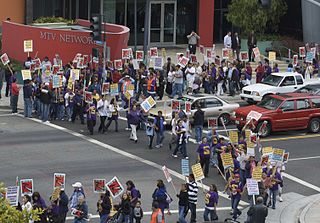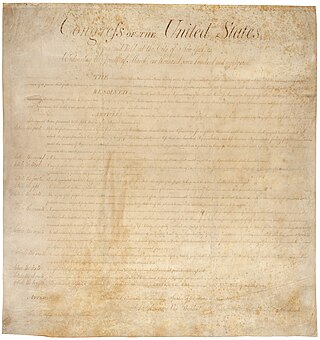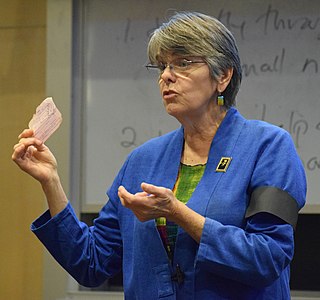Related Research Articles
Tinker v. Des Moines Independent Community School District, 393 U.S. 503 (1969), was a landmark decision by the United States Supreme Court that recognized the First Amendment rights of students in U.S. public schools. The Tinker test, also known as the "substantial disruption" test, is still used by courts today to determine whether a school's interest to prevent disruption infringes upon students' First Amendment rights. The Court famously opined, "It can hardly be argued that either students or teachers shed their constitutional rights to freedom of speech or expression at the schoolhouse gate."
Symbolic speech is a legal term in United States law used to describe actions that purposefully and discernibly convey a particular message or statement to those viewing it. Symbolic speech is recognized as being protected under the First Amendment as a form of speech, but this is not expressly written as such in the document. One possible explanation as to why the Framers did not address this issue in the Bill of Rights is because the primary forms for both political debate and protest in their time were verbal expression and published word, and they may have been unaware of the possibility of future people using non-verbal expression. Symbolic speech is distinguished from pure speech, which is the communication of ideas through spoken or written words or through conduct limited in form to that necessary to convey the idea.
The term in loco parentis, Latin for "in the place of a parent", refers to the legal responsibility of a person or organization to take on some of the functions and responsibilities of a parent.
United States v. O'Brien, 391 U.S. 367 (1968), was a landmark decision of the United States Supreme Court, ruling that a criminal prohibition against burning a draft card did not violate the First Amendment's guarantee of free speech. Though the court recognized that O'Brien's conduct was expressive as a protest against the Vietnam War, it considered the law justified by a significant government interest unrelated to the suppression of speech and was tailored towards that end.
Bethel School District v. Fraser, 478 U.S. 675 (1986), was a landmark decision of the Supreme Court of the United States in which the Court upheld the suspension of a high school student who delivered a sexually suggestive speech at a school assembly. The case involved free speech in public schools.

Board of Education, Island Trees Union Free School District No. 26 v. Pico, 457 U.S. 853 (1982), was a landmark case in which the United States Supreme Court split on the First Amendment issue of local school boards removing library books from junior high schools and high schools. Four Justices ruled that it was unconstitutional, four Justices concluded the contrary, and one Justice concluded that the court need not decide the question on the merits. Pico was the first Supreme Court case to consider the right to receive information in a library setting under the First Amendment, but the court's fractured plurality decision left the scope of this right unclear.
Morse v. Frederick, 551 U.S. 393 (2007), is a United States Supreme Court case where the Court held, 5–4, that the First Amendment does not prevent educators from prohibiting or punishing student speech that is reasonably viewed as promoting illegal drug use.

Broussard v. School Board of Norfolk, 801 F. Supp. 1526 was a court case that took place in Norfolk, Virginia, United States in 1992. Kimberly Broussard, a middle school student was disciplined by the Norfolk Public Schools for wearing a t-shirt that read "Drugs Suck". When her parents sued on her behalf, her lawyer claimed that her shirt was a form of free speech protected by the First Amendment of the United States Constitution and the Tinker Standard. The United States District Court for the Eastern District of Virginia ruled in favor of the school board, saying that although the shirt displayed an anti-drug message, the word "suck" was a vulgar word with a sexual connotation and therefore not allowed in school.
Erie v. Pap's A. M., 529 U.S. 277 (2000), was a landmark decision by the Supreme Court of the United States regarding nude dancing as free speech. The court held that an ordinance banning public nudity did not violate the operator of a totally nude entertainment establishment's constitutional right to free speech.

Desilets v. Clearview Regional Board of Education, 137 N.J. 585 (1994), was a New Jersey Supreme Court decision that held that public school curricular student newspapers that have not been established as forums for student expression are subject to a lower level of First Amendment protection than independent student expression or newspapers established as forums for student expression.

In Guiles v. Marineau, 461 F.3d 320, cert. denied by 127 S.Ct. 3054 (2007), the U.S. Court of Appeals for the Second Circuit held that the First and Fourteenth Amendments to the Constitution of the United States protect the right of a student in the public schools to wear a shirt insulting the President of the United States and depicting images relating to drugs and alcohol.

The right to protest may be a manifestation of the right to freedom of assembly, the right to freedom of association, and the right to freedom of speech. Additionally, protest and restrictions on protest have lasted as long as governments have.
California Education Code 48907 (1977), also known as the California Student Free Expression Law, acts as a counter to the Hazelwood v. Kuhlmeier (1988) Supreme Court ruling, which limited the freedom of speech granted to public high school newspapers. The Hazelwood v. Kuhlmeier decision held that public school curricular student newspapers that have not been established as "forums for student expression" are subject to a lower level of First Amendment protection than independent student expression or newspapers established as forums for student expression. Ed Code 48907 affirms the right of high school newspapers to publish whatever they choose, so long as the content isn't explicitly obscene, libelous, or slanderous, and doesn’t incite students to violate any laws or school regulations. The newspaper content must also pass the minimal disruption test set forth in the Supreme Court ruling on Tinker v. Des Moines (1969). In contrast with Hazelwood, which limited First Amendment protection to only those high school newspapers that had, through practice or policy, been established as forums for student expression, Ed Code 48907 affirms the right of all newspapers to the freedom of expression.
The issue of school speech or curricular speech as it relates to the First Amendment to the United States Constitution has been the center of controversy and litigation since the mid-20th century. The First Amendment's guarantee of freedom of speech applies to students in the public schools. In the landmark decision Tinker v. Des Moines Independent Community School District, the U.S. Supreme Court formally recognized that students do not "shed their constitutional rights to freedom of speech or expression at the schoolhouse gate".

In the United States, some categories of speech are not protected by the First Amendment. According to the Supreme Court of the United States, the U.S. Constitution protects free speech while allowing limitations on certain categories of speech.

Mary Beth Tinker is an American free speech activist known for her role in the 1969 Tinker v. Des Moines Independent Community School District Supreme Court case, which ruled that Warren Harding Junior High School could not punish her for wearing a black armband in school in support of a truce in the Vietnam War. The case set a precedent for student speech in schools.
Hazelwood School District et al. v. Kuhlmeier et al., 484 U.S. 260 (1988), was a landmark decision by the Supreme Court of the United States which held, in a 5–3 decision, that student speech in a school-sponsored student newspaper at a public high school could be censored by school officials without a violation of First Amendment rights if the school's actions were "reasonably related" to a legitimate pedagogical concern.
Mahanoy Area School District v. B.L., 594 U.S. 180 (2021), was a United States Supreme Court case involving the ability of schools to regulate student speech made off-campus, including speech made on social media. The case challenged past interpretations of Tinker v. Des Moines Independent Community School District and Bethel School District v. Fraser in light of online communications.

Layshock v. Hermitage School District, 593 F.3d 249 (2010), was a freedom of speech case of the United States Court of Appeals for the Third Circuit in which the arguments surrounded the online speech of a public school student. The appeals court affirmed the decision of the district court that the student's suspension for parodying his principal online was unconstitutional.

Kowalski v. Berkeley County Schools, 652 F.3d 565 (2011), was a freedom of speech case of the United States Court of Appeals for the Fourth Circuit over the online speech of a public school student. The appeals court affirmed the decision of the district court that the student's suspension for online harassment of a fellow student was constitutional.
References
- Alexander, K.; Alexander, M.D. (2011). American Public School Law. Cengage Learning. ISBN 978-0-495-91049-7 . Retrieved 30 September 2018.